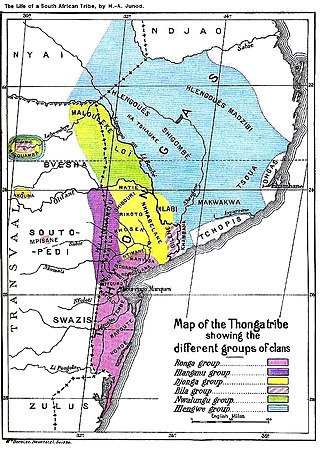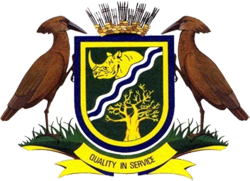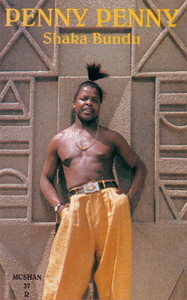Related Research Articles

The music of South Africa exhibits a culturally varied musical heritage in conjunction with the multi-ethnic populace. Genres with the greatest international recognition being mbube, isicathamiya, mbaqanga, afrofusion, kwaito, South African pop music, afro house, South African hip hop, Shangaan electro, bacardi house, bolo house, gqom and amapiano.

Tsonga or, natively, Xitsonga, as an endonym, is a Bantu language spoken by the Tsonga people of South Africa. It is mutually intelligible with Tswa and Ronga and the name "Tsonga" is often used as a cover term for all three, also sometimes referred to as Tswa-Ronga. The Xitsonga language has been standardised for both academic and home use. Tsonga is an official language of the Republic of South Africa, and under the name "Shangani" it is recognised as an official language in the Constitution of Zimbabwe. All Tswa-Ronga languages are recognised in Mozambique. It is not official in Eswatini.

The Tsonga people are a Bantu ethnic group primarily native to Southern Mozambique and South Africa. They speak Xitsonga, a Southern Bantu language. A very small number of Tsonga people are also found in Zimbabwe and Northern Eswatini. The Tsonga people of South Africa share some history with the Tsonga people of Southern Mozambique, and have similar cultural practices, but differ in the dialects spoken.

The Vhembe District Municipality is one of the 5 districts of the Limpopo province of South Africa. It is the northernmost district of the country and shares its northern border with the Beitbridge District in Zimbabwe and on the east with the Gaza Province in Mozambique. Vhembe consists of all the territories that were part of the former Venda Bantustan; however, two large densely populated districts of the former Tsonga homeland of Gazankulu, in particular, Hlanganani and Malamulele, were also incorporated into the municipality, hence the ethnic diversity of the district. The seat is Thohoyandou, the capital of the former Venda Bantustan. According to the 2011 census, the majority of the municipality's 800,000 inhabitants spoke TshiVenda as their mother language, while 400,000 spoke Xitsonga as their home language. However, the Tsonga people form the majority south of the Levubu River, while the Venda are the minority south of Levubu at 15%. The Sepedi speakers number 27,000. The district code is DC34.
The Chopi are a Bantu ethnic group of Mozambique. They have lived primarily in the Zavala region of southern Mozambique, in the Inhambane Province. They traditionally lived a life of subsistence agriculture, traditionally living a rural existence, although many were displaced or killed in the civil war that followed Mozambique's liberation from Portuguese colonial rule in 1975. In addition, drought forced many away from their homeland and into the nation's cities.

The xibelani dance is an indigenous dance of the Tsonga women from Mpumalanga and Limpopo located in South Africa. The name of the dance comes from the native Xitsonga language and it can translate to "hitting to the rhythm", for example, the concept "xi Bela ni vunanga". The name "xibelani" typically refers to the dance style while the skirt itself is referred to as "tinguvu", however, the term "xibelani" is sometimes used to refer to both the dance and the skirt.
Christian electronic dance music, also known as CEDM, Christian EDM, Christian dance music, CDM, or Christian electronic music is a genre of electronic dance music and Christian music. Its musical styles closely mirror non-Christian EDM; however, the CEDM culture's lack of drug use and emphasis on positive lyrics distinguish it from non-religious counterparts. EDM.com wrote "the [CEDM] culture can feel quite welcoming." Many live concerts and events have been held in Christian churches in addition to traditional venues such as Lumination, Creation Festival and LifeLight Music Festival. CEDM has also been incorporated into some Christian worship routines.
Dr Thomas Hasani "Shinyori" Chauke is a South African Xitsonga musician. Chauke was granted an honorary doctorate in African languages for the role his music has played in the development of the Xitsonga language.
Nthato Monde James Mokgata, known by his stage name Spoek Mathambo, is a South African artist, producer, singer-songwriter and rapper. Mathambo rose to fame in the late 2000s with his fusion of a wide array of musical influences. He is known for coining the term ‘Township Tech’, to describe his sound.

Nozinja is a South African musician, producer and DJ, credited with the creation and popularisation of the 'shangaan electro' genre of African dance music, influenced by traditional folk, Tsonga disco, Kwaito house and township backstreet dance styles from the Limpopo region of South Africa.

Rashad Harden, known as DJ Rashad, was a Chicago-based electronic musician, producer and DJ known as a pioneer in the footwork genre and founder of the Teklife crew. He released his debut studio album Double Cup on Hyperdub in 2013 to critical praise. He died in April 2014 from a drug overdose.
Gqom, gqom tech, sgubhu, 3-step or G.Q.O.M) is an African electronic dance music genre and subgenre of house music, that emerged in the early 2010s from Durban, South Africa, pioneered and innovated by music producers Naked Boyz, Rudeboyz, Sbucardo, Griffit Vigo, Nasty Boyz, DJ Lag, Menzi Shabane, Distruction Boyz and Citizen Boy.

Maya Christinah Xichavo Wegerif, known professionally as Sho Madjozi, is a South African rapper, singer, songwriter, actress and poet. Madjozi incorporates the Tsonga culture through her music and public image. In 2019, Madjozi was named as one of Forbes Africa's 30 Under 30 for her contribution in the music and entertainment sector.

Shaka Bundu is the debut album by South African musician Penny Penny, released in 1994. Recorded over the space of one week using an Atari computer, Korg M1 synthesizer, and reel-to-reel tape, the album blends the Tsonga disco style of music with American house music, reflecting the popularity of American and British electronic dance music in South Africa. It has been credited for pioneering a new style of Tsonga disco with its fusion of slow house rhythms, synthesized steel drums, and Penny's modern vocal style atop traditional call-and-response female backing vocals.
Eric Kulani Giyani Nkovani, better known by his stage names Penny Penny and Papa Penny is a South African musician and politician, known affectionately as the "Shangaan Disco King" for the musical style he helped popularise.

Wills Glasspiegel is an American filmmaker, artist, scholar and community organizer from Chicago. Dr. Glasspiegel has spent several years working alongside electronic musicians and dancers from Sierra Leone, South Africa and Chicago. In 2017, he co-founded the arts and racial justice nonprofit, Open the Circle. He has produced public radio segments for All Things Considered and Morning Edition, and was recognized as a co-recipient of a Peabody Award in 2014 for his contributions to the public radio program Afropop Worldwide. Wills' collaborations have been featured in a variety of publications including CNN, FADER Magazine, Dazed Magazine, Pitchfork, New York Times, Wall Street Journal, The Guardian, and Chicago Tribune. He worked from 2016-2023 as an artist and filmmaker with The Era Footwork Crew, including as creative director for The Era's touring performance,IN THE WURKZ, a show that won the National Dance Project award in 2019 from the New England Foundation for the Arts. Glasspiegel's work has been recognized with prizes from the MacArthur Foundation, the Field Foundation, the National Endowment for the Arts, and the City of Chicago. His films and installations have screened at Stony Island Arts Bank, the Museum of Contemporary Art Chicago, the Walker Art Center, Minneapolis Institute of Arts, MANA Contemporary, Shibuya crossing in Japan, and several times with Art on the Mart in Chicago.

Limpopo Champions League is the debut studio album by South African rapper Sho Madjozi. It was released on 14 December 2018 by Flourish and Multiply.
Amapiano is a subgenre of kwaito and house music that emerged in South Africa in the mid-2010s. It is a hybrid of deep house, gqom, jazz, soul and lounge music characterized by synths and wide, percussive basslines. The word "amapiano" derives from the IsiZulu word for "pianos".
Marvin Ramalepe, widely known as DJ Spoko was a South African record producer and DJ. He gained fame for co-producing DJ Mujava's, "Township Funk" as well as his pioneering work in bacardi house.
References
- ↑ Bradshaw, Melissa. "What's The Name Of My Nation? Dancing Shangaan Electro With Nozinja". The Quietus. Archived from the original on June 8, 2024. Retrieved March 26, 2014.
- ↑ "Get your head around South Africa's gqom scene". Red Bull. May 11, 2017. Archived from the original on May 9, 2024. Retrieved June 8, 2024.
- ↑ Connors, Will. "Nozinja's Beats Help Soweto Dance Faster". Wall Street Journal. Archived from the original on June 8, 2024. Retrieved April 2, 2014.
- ↑ "Shangaan Electro". Honest Jon's. Archived from the original on December 17, 2013. Retrieved April 2, 2014.
- ↑ Gedye, Lloyd. "Nozinja: The world at his feet". Mail & Guardian. Archived from the original on April 7, 2014. Retrieved April 2, 2014.
- ↑ Andrew, Ryce. "Various Artists - Shangaan Shake". Resident Advisor. Archived from the original on April 7, 2014. Retrieved April 2, 2014.
- ↑ "SHANGAAN SOUND ARCHITECT NOZINJA PREPS 12" FOR JIAOLONG UNDER XITSONGA DANCE ALIAS". Fact Mag. January 15, 2013. Archived from the original on April 7, 2014. Retrieved April 2, 2014.
- ↑ "Da Multi Snake - Volume 1". SHANGAANBANG. Archived from the original on April 2, 2015. Retrieved March 6, 2015.
- ↑ Bakare, Lanre (July 5, 2013). "Shangaan electro: The Soweto dance craze that's about to go global". The Guardian. Archived from the original on May 27, 2024. Retrieved April 2, 2014.
- ↑ Chal, Ravens (July 17, 2013). ""NO SPEED, NO DANCE": SHANGAAN ELECTRO HITS LONDON". Fact Magazine. Archived from the original on April 7, 2014. Retrieved April 2, 2014.
- ↑ "RhythmTravels.com". Archived from the original on October 13, 2014. Retrieved October 8, 2014.